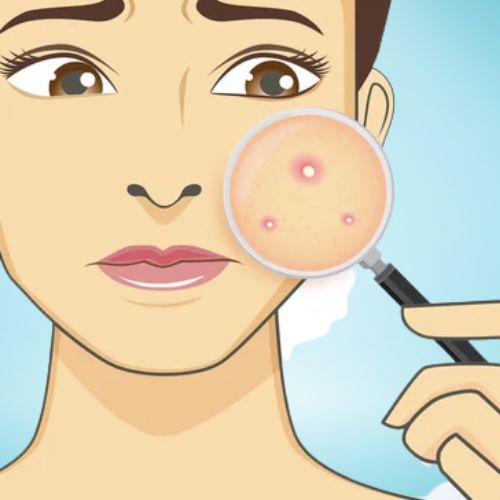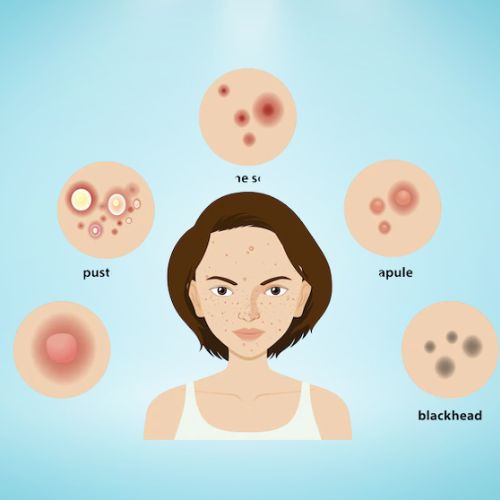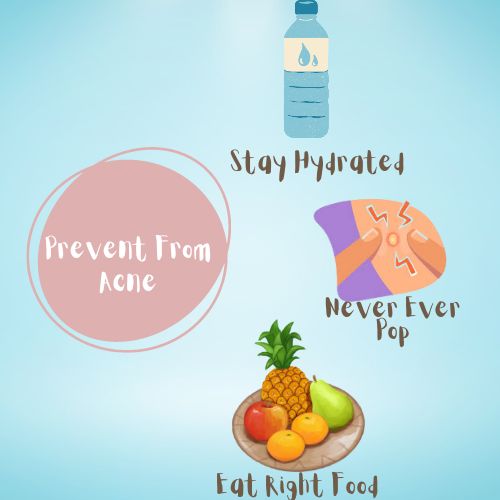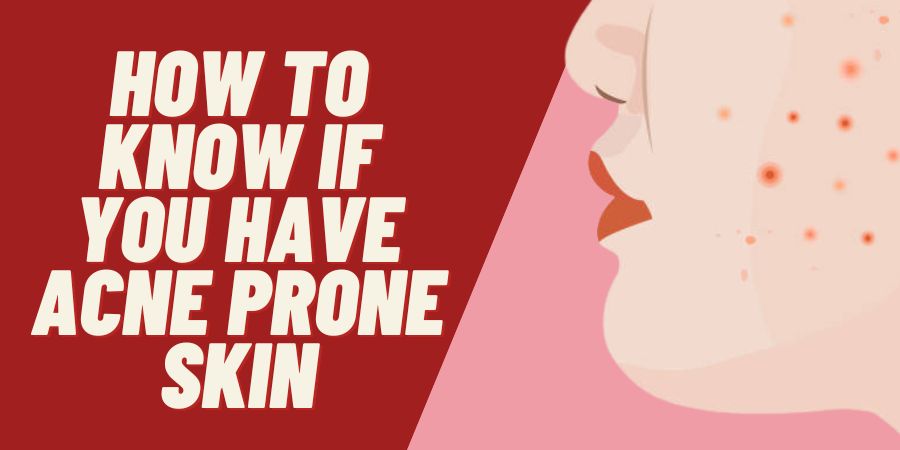How to know if you have acne prone skin? Acne prone skin is more noticeable than any other skin type. The main signs of acne prone skin are frequent breakouts, excessive oil production, clogged or large visible pores, and redness.
What if you don’t know the right type of skin and keep doing the wrong thing? It’s a nightmare buddy!
| Image | Product | Features | Price |
|---|---|---|---|
 | EltaMD Foaming Facial Cleanser |
| Check Price |
 | DERMA E Hydrating Gentle Cleanser |
| Check Price |
 | La Roche-Posay Effaclar Medicated Gel Cleanser |
| Check Price |
 | PanOxyl Antimicrobial Acne Creamy Wash |
| Check Price |
 | Neutrogena Oil-Free Acne Fighting Face Wash |
| Check Price |
There is no doubt that everyone has different types of skin — dry, oily, sensitive or acne prone. And, every kind of skin needs a different type of treatment.
Whatever, as per me, the most hectic skin is acne prone skin. Acne bumps are the worst. Treating them, suffering them, hiding them, and exposing them is a heartbreaking thing. Why am I saying that? I have gone through it.
The mistake that I made was not knowing that I had acne prone skin. Though I got bumps for a very long time, I ignored them. But you know what? I cured them! When you know you have acne prone skin, you treat it in the appropriate manner and cure it quickly. Puzzling is, how to know if you have acne prone skin. Worry not, because I am here for you. In this post, I will guide you on how to know if you have acne prone skin.
Get set gooo…
Table of Contents
What Is Acne?

Acne is a skin disease consisting of blemishes that can occur on your face, neck, chest, shoulders, and back. Acne is very common during the teen years but it can affect you during adulthood as well.
Dr. Gerstner, on the other hand, emphasizes that acne can strike at any age.
So let’s understand acne deeply…
To keep your hair and skin well lubricated, your body depends on sebaceous glands which just sit under your skin. These glands secrete an oily substance called sebum which coats your hair and skin to prevent them from drying out. Sebum travels up hair follicles and out through your pores onto the surface of your skin. Your hair follicles routinely shed dead skin cells, which sebum carries out of your body.
When your body produces extra sebum and dead skin cells, they can stick together and clog your pores resulting in skin blemishes. It is not necessary as Michele Green, MD says;
“While it’s true that excess sebum production can contribute to the development of acne, you can be acne-prone without having oily skin.”
Afterwards, bacteria that normally exist in a small amount of your skin can flourish in the sebum in the clogged pores leading to inflammation. Depending on where the clog is located and if you have inflammation, acne may appear as a white head or pimple which are inflamed follicles clogged with pus or cysts.
Best Acne Cleanser
| Image | Product | Features | Price |
|---|---|---|---|
 | EltaMD Foaming Facial Cleanser |
| Check Price |
 | DERMA E Hydrating Gentle Cleanser |
| Check Price |
 | La Roche-Posay Effaclar Medicated Gel Cleanser |
| Check Price |
 | PanOxyl Antimicrobial Acne Creamy Wash |
| Check Price |
 | Neutrogena Oil-Free Acne Fighting Face Wash |
| Check Price |
What Is Acne Prone Skin?

Basic sense, if you suffer acne outbreaks on a regular basis, you have acne-prone skin. This isn’t your typical pimple eruption, which occurs on occasion, but rather a common occurrence that affects your skin with acne and, in a few cases, irritated skin.
As per Katie Rodan;
“If you notice big, cystic bumps every so often, you can be considered acne prone.”
Acne-prone skin is a common skin chronic problem that takes months, if not years, of therapy to maintain healthy skin. That suggests acne isn’t simply an adolescent problem!
Moreover, sometimes you see many zits all on the forehead and they are caused by a fungus which is normally present on the skin and on the scalp. It tends to overgrow in times of humidity or stress and then spread slowly all over the face.
Best Products For Treating Acne
| Image | Product | Features | Price |
|---|---|---|---|
 | The Ordinary Azelaic Acid Suspension 10% | Check Price | |
 | CeraVe PM Facial Moisturizing Lotion |
| Check Price |
 | CETAPHIL Moisturizing Lotion |
| Check Price |
 | CeraVe Acne Foaming Cream Cleanser |
| Check Price |
 | Neutrogena Oil-Free Acne Fighting Face Wash |
| Check Price |
 | Acne Treatment Differin Gel, 30 Day Supply |
| Check Price |
Types Of Acne Prone Skin
Since there are many types of acne, I will tell you the most common ones.

1. Comedones
So the first type of acne that many people commonly have is comedones. It is basically of two types, open comedones — whiteheads, and closed comedones — blackheads. This is a result of the pores getting clogged.
Things to remember, comedogenic products are those that have the potential to cause comedones. Non Comedogenic makeup is much less inclined to clog pores and lead to acne.
2. Acne Vulgaris
Acne vulgaris sounds like comedones evil twin and to be honest. It is caused by deeper blockage of the pores.
While Vulgaris sounds as vulgar it actually isn’t. well, get it simple, it means common and this makes sense since acne vulgaris is the most common type of acne. There are three different forms of it, mild, moderate and severe.
It is common in adolescent years when hormones are changing. It happens when the pores get clogged and inflamed because of sebaceous units, which in layman’s terms means the hair follicle and sebaceous gland.
Acne vulgaris is a bit harder to treat; it needs benzoyl peroxide anti-inflammatory products and other topical treatments.
3. Adult Female Acne
You read that right ladies!
Just when you thought you could kiss acne when waving off your teen you might be wrong as these little monsters make an appearance in adulthood again.
Notice, that Adult acne is most common in females than in males because females go through more hormonal changes during menstruation, pregnancy, and menopause.
Don’t worry, it doesn’t happen to everybody. It only depends on your body and the changes it undergoes.
4. Papules
Papules are inflammatory comedones that develop little red or pink lumps on the skin. This sort of pimple may hurt to the touch.
However, touching or squeezing can aggravate the irritation and cause scars. The presence of a significant lot of papules may suggest moderate to extreme acne.
5. Nodules
Nodules are huge, inflammatory pimples that have a solid feel to them. They form deep beneath the skin and are frequently unpleasant. Because nodules might scar, they should be cured by a dermatologist.
6. Acne Mechanica
Acne Mechanica is produced by heat, rubbing, and compression against the skin, which is frequently induced by the usage of sports equipment such as a helmet or baseball cap.
Since it occurs commonly among athletes, it is sometimes referred to as “sports-induced acne.” Wearing absorbent material under athletic apparel and washing soon after an activity is two defensive methods.
Common Symptoms Of Acne

So, the following symptoms can help you identify if you have acne prone skin. Mind them!
1. Clogged Pores
The pores on your skin can and will get blocked at some point. Any dirt, debris, and anything else from the big, evil world can sneak in there and ruin your vibe. Clogged pores can cause the skin to seem lifeless.
2. Redness
Redness from pimples can develop due to hormone swings or simply pressure to the follicles, which causes an inflammatory reaction. Red and white blood cells are sent by your body to battle enemies of your epidermis.
The final outcome? An unpleasant and painful zit ringed by redness that is sensitive when touched. Ugh!
3. Excessive Oil Production
Although this might be a distinct skin type, any skin can shift from dry to oily as acne fluctuates over time. Our skin has a range! All skin requires a proper oil balance, but sebum is essential for skin health—too much sebum may cause oily skin and clogged pores, leading to acne.
Oily skin is caused by sebaceous glands producing too much oil, and excess oil causes blockage. Far too oily skin is distinguished by larger pores, too much shine all day, and a heavier skin and greasy texture.
4. Large Pores
The size of your pores is often genetically determined, we understand, it’s weird. Aside from genetics, the most prevalent causes of big pores are excessive sebum production and a loss of skin suppleness.
Chronic acne, hormonal variations, UV injury, alcoholism, radiodermatitis, and vitamin A deficiency are all contributors.
What To Do When You Have Acne Prone Skin?

You know what when people get severe acne, they literally have to get steroids injected. So, it’s better to treat your acne right before it becomes a horrible experience. The things you have to focus on are;
1. Stay Hydrated
Water is required for all biological activities, including the liver, which regulates hormone synthesis. Hormones contribute to acne by boosting the production of sebum, which is why acne is common among teens during hormone surges.
Drinking water will help you stay healthy. Drink two litres of water every day, or more if you exercise.
2. Never Ever Pop Your Pimples
When you initially picked at a pimple, it bled, ached, and then dried out. However, guess what? It reappears, this time much larger. It is like a tragedy waiting to happen.
When you burst a pimple, you are forcing the stuff of the pimple, including germs, oil, and debris, out. It causes a rip and a new wound. Instead of resolving the issue, it causes the ugly wound to gooey substance down the pimple hole, potentially resulting in a larger pimple.
DON’T TOUCH YOUR PIMPLES, THAT’S IT!
3. Avoid Makeup
Wear no make-up if possible, since it may cause your pores to get even more clogged. If you must disguise blemishes and scars, choose a mineral-based foundation and concealer that does not include extra oils. The natural ingredient will not irritate or inflame your skin, and it is less prone to clog your pores.
4. Don’t Ignore Moisturiser
Because moisturisers assist regulate sebum production, you should include one in your routine. Or else, you will have itching and stretching around the acne. I’ve had the greatest difficulty with moisturisers: it took me several months to locate one that didn’t block my pores while yet giving appropriate hydration.
I would recommend a gel-like moisturiser with hyaluronic acid, B5, or squalane. They have a light, non-greasy feel.
5. Eat Right Food
A variety of foods, including almonds, blueberries, avocados, and kidney beans, may aid in decreasing and avoid inflammation. This may reduce the likelihood of your skin developing unpleasant and irritated patches, which may make life hell.
Frequently Asked Questions (FAQs)
What skin type is more prone to acne?
Acne may affect anybody, but persons with oily skin are more prone to breakouts. If you have oily skin, you may have enlarged pores and acne blemishes, and be more prone to acne outbreaks.
What causes acne prone?
Sebum cannot exit the pores when oil, dead skin cells, and germs block the follicles. This results in acne.
Is acne prone skin dry or oily?
Because acne-prone skin is oily, it might be enticing to use astringents and facial moisturizers till your face gets dry. However, do not. Irritated skin is dry skin. You risk developing more acne if you irritate your skin.
How do I stop acne prone skin?
Taking the right treatment can cure acne prone skin.
-Wash your face with the right cleanser
-Use salicylic or benzoyl acid-based products
-Drink and sleep enough
-Don’t pick your pimples
-Don’t ignore SPF or moisturiser
What food cause acne?
Too much sugary foods can cause acne. However, avoid sodas, white bread and rice, and excessive consumptions of carbohydrates.
Now, It’s Your Turn!
Although annoying, acne-prone skin may be comforted and cured! You are NEVER alone if you suffer from acne. You can treat it with the correct coaching, lifestyle choices, and personal care!
However, acne sometimes happens in certain persons owing to hormonal or genetic causes. If this describes you, it can also be cured. There are actions you can do to avoid and cure it, such as utilising acne treatments and skin care products, taking certain vitamins, eating a nutritious diet, and managing stress. And for this, it is very necessary to know that YOU HAVE ACNE PRONE SKIN. And yes, if you have suffered from an acne journey please do tell us and help others in the comment section how you overcome that.
Related Articles:


